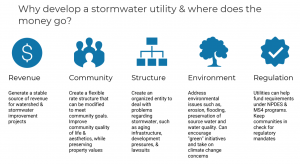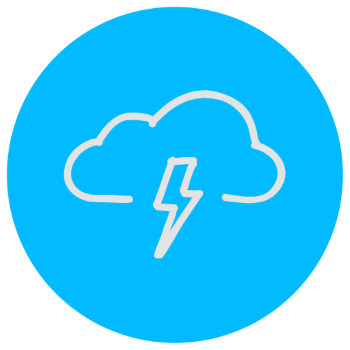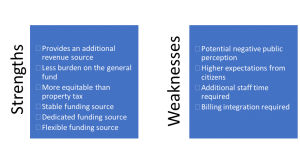Leigh DeForest is a graduate fellow in the 2019 Leaders in Environment and Finance (LEAF) program. As a part of the LEAF Fellowship, Leigh spent the summer of 2019 working at Triangle J Council of Governments. While at Triangle J she researched the ancillary benefits of stormwater utilities and green stormwater infrastructure as well as contributing to the Jordan Lake One Water initiative.
When communities consider establishing a potential new stormwater fee, residents may inquire about why they are being charged and where their money is going. Forming a stormwater utility fee creates a dedicated revenue source that can be used to support long-term planning for the control of urban stormwater runoff that benefits both the community’s functionality and the surrounding environment. Both permitted and non-permitted municipalities can benefit from instituting a stormwater utility.

The Town of Apex
After experiencing some drainage complaints and lacking a dedicated funding source and stormwater staff, the Town of Apex, North Carolina recently decided to implement a stormwater fee starting in the year 2020. Since 2015 there have been 464 drainage complaints, averaging around 115 per year. Most of the complaints came from pre-existing subdivisions that were constructed before floodplain regulations and riparian buffer rules were put into place. The town does not currently fund private drainage solutions, only public solutions like curbing and storm drain infrastructure. Apex is hopeful that with the addition of the fee some of these issues can be resolved.
Apex’s current stormwater program is funded through the town’s general fund. The current estimated yearly budget is $1,150,000, with $740,000 going to water quality programs, $400,000 to stormwater system maintenance and $10,000 for the floodplain program.
The new stormwater fee will add a $4.00 monthly rate per ERU (2,500 sq. ft. = 1 ERU). Based on Apex’s current square footage of impervious surface, the annual revenue potential for Apex is between $900,000 – $1,200,000. As Apex continues to grow, the future revenue potential is approximately between $1,600,000- $2,300,000 annually. Below are examples of typical monthly fees:
| Rate Payer | Typical Impervious Surface (ft2) | Typical Monthly Fee
|
| Residence | 2,500 | $4.00 |
| Small downtown business | 4,400 | $7.04 |
| Large box retailer | 560,000 | $896.00 |
In evaluating whether to establish a stormwater fee, the Town of Apex considered the following:
The Takeaway
Stormwater utilities provide a necessary service by delivering proper stormwater conveyances, controls, and treatments. The current Apex stormwater program meets the minimum federal requirements, but at a cost of $1.15 million annually, taken out of the general fund. A stormwater utility fee charges based on impervious surfaces directly related to the amount of stormwater generated from the property; this creates a more service-based allocation of cost.
The creation of a stormwater utility fee creates a reliable funding source to pay for Apex’s stormwater services. These funds have the potential to be used for addressing some water quality issues including preserving source waters, addressing regulatory mandates, cultivating healthy recreation areas and fisheries, and relieving stress on aging, clogged, and inadequate infrastructure. These are all reasons why a stormwater utility fee is a dependable investment in the future of Apex’s environmental health.
More Resources
Interested in a past EFC blog post on Stormwater Fees in North Carolina? Check out Stormwater Utility Fees in North Carolina: Now and Then
Want to keep up with stormwater-related issues? Sign up for the stormwater listserv. The main goal of the stormwater listserv is to provide financial, administrative, and management assistance to individuals and organizations involved with managing stormwater programs.






Leave a Reply